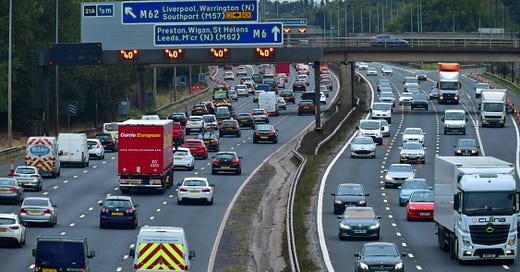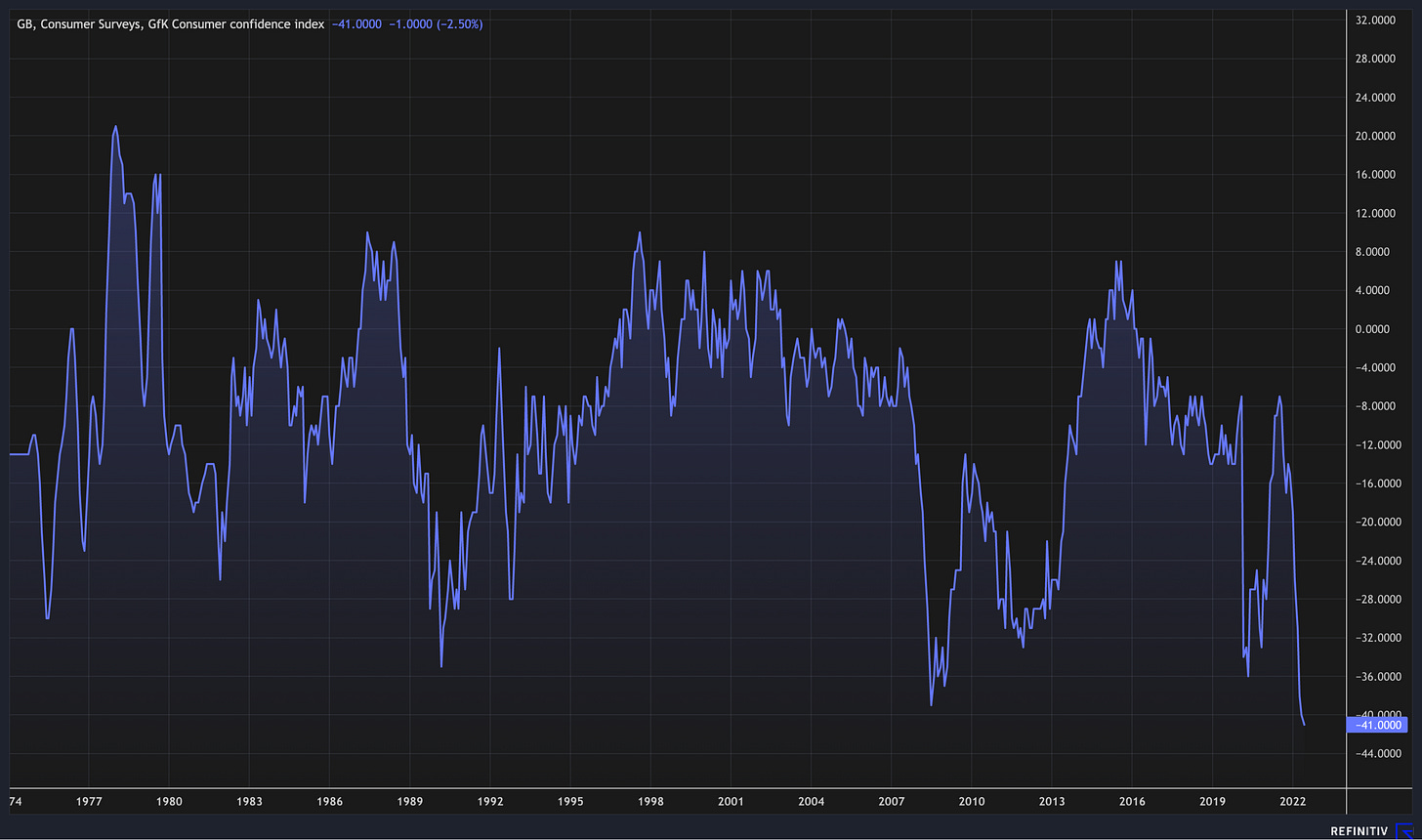Where are all these people going?
UK and cars + High streets + By-election analysis + Best service station
“Where are all these people going? Don’t they realise that petrol is £2-a-litre now?” That was my taxi driver on Sunday as my son and I were stuck in heavy traffic in East London heading to my niece’s birthday party. I had the same thought yesterday as I drove up to Cumbria to see my parents. The A12, M25, M1 and M6 were all busy. Yes, there is a train strike this week, but this was in the middle of the day, so it wasn’t commuters. Also, this isn’t just about this week, data shows that road traffic is up in general. Despite a cost-of-living squeeze, the threat of a recession, people working from home, and a push to cut carbon emissions, people across the country are still driving all the time. Why?
Consumer confidence data published by GFK this morning suggests that it’s not because households feel good about the world. Consumer confidence has hit the lowest on the GFK barometer since the survey started in 1974. It fell to -41 for June, down from -40 in May. This is lower than during the oil crisis of the 1970s, lower than during the early 1990s and lower than during the financial crisis. Here is Refinitiv’s graph of the GFK consumer confidence index since it began…
Fuel prices, of course, are one of the costs that have gone up most for households in recent months as the price of oil has surged due to the war in Ukraine. The UK inflation figures published this week showed inflation running at 9.1 per cent in May as measured by the consumer price index. However, it also showed that the average price of petrol had risen from 127.7p to 165.9p-a-litre over the last year, a 30 per cent increase. Judging by my drive yesterday it is far more than that now, with many petrol stations - particularly at service stations - charging more than 200p-a-litre for petrol and diesel.
However, this combination of weak consumer confidence and rising petrol prices is not translating to a notable downturn in road traffic. The latest data from the Office for National Statistics shows that on Monday road traffic was just above the level seen on the first Monday in February 2020 (101 per cent of pre-Covid levels to be precise). This traffic is not just about people driving due to rail strikes or warm weather (which encourages people to go out rather than stay at home). The level of traffic on Monday was also “broadly unchanged” compared to last week, according to the ONS, which uses traffic cameras to track this, and has hung around the same level for a while. At the end of May, for instance, it was 100 per cent of pre-Covid levels.
My former colleague at The Times, Alistair Osborne, touched on this seemingly illogical trend at the end of his superb daily column on Thursday. He pointed out that the research from the International Energy Agency in March estimated that car-free Sundays in cities across its 31 member countries (including the UK) would save 380,000 barrels of oil a day. If motorway speed limits were cut by 10km per hour you would save another 430,000 barrels of oil a day. In other words, cars getting off the road or going slower would save a lot of money. You can read that column here.
Speaking to contacts, friends and family across this UK this week two things stand out about why they are driving - necessity and reliability. Necessity because a car is the only way to get where they work or want to go. Reliability because strikes, engineering work and changes to timetables mean that post-Covid they don’t trust public transport to get them to where they need to be. The difference in price for a train or bus is not enough to persuade them to ditch the car.
It is worth remembering that way fewer people get the train to work in the UK than you might think, which helps to explain why rail workers have won more support for their strike action than many expected. As I pointed out in Sunday’s newsletter, official government statistics show that pre-Covid just 11 per cent of people got the train to work, compared to 68 per cent by car. In contrast, in London just 27 per cent use a car. Post-Covid those numbers getting the train will be even lower. The government statistics on this are here.
This all shows how crucial it is that the UK invests in electric car infrastructure. Rolling out charging points across the country is pivotal if the UK is to wean itself off a reliance on oil and gas as well as get carbon emissions and bills down. HS2 is one sort of transport investment, but charging points are another, one that is more pressing for the households and businesses who need to use their vehicle regularly.
For many parts of the UK, electric cars are still a pipe dream. Here in Kendal, south Cumbria, which has a population of about 30,000 there are just 16 public charging points. The nearest one to my parent’s house is a mile away. When I looked on Zap-Map this morning, two of these were out of service, one had “issues reported” and only one was in use. Other towns and villages have it even worse than this. However, in London there are three on our street alone. In fact, London has a third of the UK’s chargers, which is bonkers when you consider that it is people outside the capital who need them most on the basis of the data we have looked at here. A recent survey by Zap-Map found that 93 per cent of electric car drivers use the public charging network. At the end of May there were 32,312 public charging points in the UK, up 32 per cent year-on-year, according to Zap-Map…
To put that in context, 124,394 new cars were sold in the same month, including 22,787 that could be charged. Expanding the public charging network as fast and broadly as possible is essential for the UK. This will require co-operation from businesses, local authorities and the government. There is some promising work going on - Tesco has partnered with Volkswagen and Pod Point to install charging points in 500 supermarket car parks, for instance, while BP has pledged to spend £1 billion in the UK over the next 10 years rolling out charging points. But there is a long way to go…







